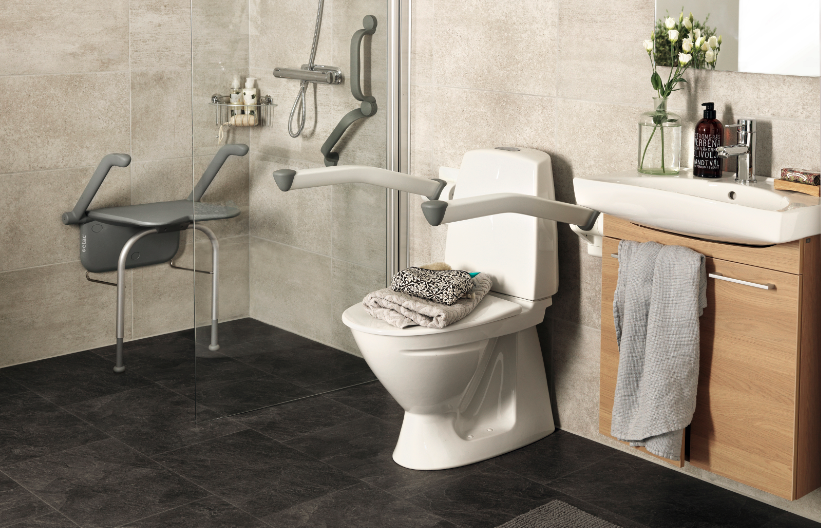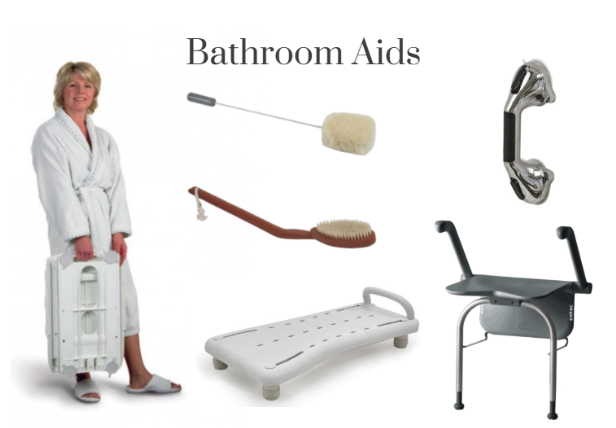Creating an accessible bathroom in your home

Converting a standard bathroom into a room that is accessible doesn’t have to be time consuming or expensive. Some simple bathroom and toileting aids can provide access and maintain independence for anyone who may need a little extra support.
How do I make my bathroom accessible and easier to use?
Converting a bathroom into a wet room may be necessary if something more specialist is required and you would need to get a quote from a bathroom professional. They can help you to design and explore all the essentials you may need such as support rail kits like a doc m pack, that can provide full support while moving around the bathroom, or a shower screen, which can help to keep water in the shower area and reduce the risk of falls in a wet room.
Bathroom mobility aids for independence
Grab rails in the bathroom can provide much-needed support and reassurance. Rails on the wall can help the user move around the room independently with a lower risk of falling or tripping, while a bathtub grab bar can provide a lift when getting in and out of the bath. Suction grab bars can be a temporary solution as they allow you to fix and move them where needed, they are also great for use when travelling.
When it comes to bathing and showering there are lots of products that are designed to help the user maintain their independence and dignity, lessening the need for a carer or partner to be there. A reclining bath lift offers the luxury of having a normal bath with the added bonus of easily getting in and out, which is ideal for anyone with back problems, arthritis or restricted movement. For a transportable option, an inflating bath lift like the Mangar bathing cushion is ideal to take on holiday or when staying with the family so a bath is an option anywhere you stay! It is also a more comfortable option compared to a mechanical bath lift as it fully submerges the user and lets them sit on the bottom of the bath as the cushion delates. With many bath lift options, there are also accessories available such as swivel seats and spare hand controllers. A static bath seat or shower seat can enable the user to sit safely as rubber feet or suckers maintain a grip on the surface to lower the risk of slipping. Many stools and seats are also height adjustable to suit any user. A bath or shower board is another alternative which provides a platform for the user to sit and wash on without getting directly into the bath or standing up in the shower. Ideal if the user needs a lot of stability but still the boards still allow for independent bathing if necessary. A bath step can provide safe support and easy access to showers, baths and high cabinets.
Simple accessories for the bathroom such as a bath and shower mat can provide peace of mind for the user and family as they lower the risk of slipping but allowing you to still independently bath, especially when teamed with a grab bar. See our guide to buying the right grab rails. Items like this and bath pillows are also ideal for travelling as they can turn a hotel bathroom into a safer area. Personal care can also be made easier with items such as long-handled sponges and brushes.

From left to right: bathmaster deltis, long handled sponge, long handled bath brush, bath board with handle, and the Etac relax shower seat
Toileting aids for independence in the bathroom
Providing support where needed can make popping to the loo that little bit easier. It is important to help maintain dignity and independence where necessary and something as simple as a raised toilet seat can work wonders for anyone who struggles to sit and stand up from the loo. To find the right one for you, check out our simple guide to choosing the right raised toilet seat. Discreet accessories such as bottom wipers and bidets are specially designed to help users who may struggle to twist and to reach. Toilet frames can provide much-needed support and can be used alongside grab rails and other bathroom mobility aids.
A commode chair or portable toilet can be a great aid in urgent situations where making it to the bathroom is not possible. Subtle enough to be kept in the bedroom or if needed in a care home, there are stylish options available that blend in easily with most decors. For emergency loo situations on-the-go or if a user is bed bound and unable to get to the toilet, a urinal is a simple toileting aid that can provide quick relief for the user and is easily re-used again when necessary.

From left to right: Economy urinal unisex, traditional commode, Etac Hi-Loo Raised Toilet Seat with Arms, and toilet safety frame.
Tops Tips for Creating A Safe Bathroom Space
- Ditch the rugs - these are the number 1 cause of falls in the home. If you can’t part ways with them, something like a rug stop will prevent them from curling in the corners and becoming hazardous.
- Keep it clean - Keep the tub and shower area clean to avoid build-up of slippery soap residue mould.
- Non-slip accessories - Anti-slip strips in the tub can provide a bit of extra grip in the bathtub.
- Avoid water accumulation - mop up any spills or overflows, especially in a wetroom to avoid the risk of slipping or it coming into contact with electrical fittings or appliances.
- Keep electrical appliances to a minimum - electric appliances such as hair dryers and electric razors should be ideally kept out of the bathroom, but if needed in there, definitely to be kept out of reach of water. Lots of wires and clutter are also tripping hazards and are often better kept in the bedroom or dressing room.
- Keep medications stored safely - out of the reach of children and in a safe spot.
- Light & bright - a well-lit bathroom is key to lowering the risk of trips and falls.
- Make sure everything is attached securely - it’s important to secure rails, frames and suction items securely to ensure peace of mind and safety.
If anything specialist is needed for certain conditions, it is always best to consult your doctor or occupational therapist who will be able to guide you in the right direction as to which mobility aids will be suitable for you. View our full range of bathroom and toileting aids.